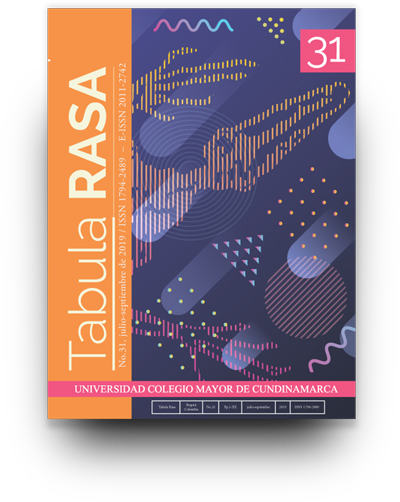Animal readings of precarious lives : the “species discourse” and the rules of being human.
Lecturas animales de las vidas precarias : el "discurso de la especie" y las normas de lo humano.
Show authors biography
This paper asks whether the so-called ‘animal question’ may be a strategic instance to deconstruct human normative and sacrificial constructs, and to stake ethical-political bets challenging differential hierarchies on life forms. Drawing from Jacques Derrida’s notion of ‘sacrificial structure’, Judith Butler’s precarious lives analysis, and Cary Wolfe’s notion of ‘species discourse’, we argue that the animal question is a crucial point to deconstruct the ‘rules of being human’, defining habitable and inhabitable bodies, and thus defining which lives are to be sacrificed. In this line, we argue that a politics of animality is needed, which contravenes and watches the «human only», disturbing the axes of precarization around gender, class, race, and species, in order to be able to commit to non-hierarchical forms of interspecies communities.
Article visits 229 | PDF visits 120
Downloads
- Adams, C. (2017). Proteína feminizada: significado, representaciones e implicancias. En M. M. Andreatta, S. Pezzetta, E. Rincón, E. (Eds.). Crítica y animalidad: cuando el otro aúlla, (pp. 72-97). La Plata: ELECA. Recuperado de: http://bit.ly/criticayanimalidad
- Ávila, I. (2016). De la Santamaría y las corralejas a la metafísica occidental, y viceversa. En I. Ávila (comp.). La cuestión animal(ista), (pp. 45-72). Bogotá: Desde Abajo.
- Ávila, I. (2013). De la isla del doctor Moreau al planeta de los simios. La dicotomía humano- animal como problema político. Bogotá: Desde Abajo.
- Biset, E. (2008). Soberanía, animalidad y política. Nombres, 8(22), 125-144. Braidotti, R. (2015). Lo posthumano. Barcelona: Gedisa.
- Butler, J. (2017). Cuerpos aliados y lucha política. Barcelona: Paidós.
- Butler, J. (2009). Marcos de guerra. Las vidas lloradas. Buenos Aires: Paidós. Butler, J. (2007). El género en disputa. Barcelona: Paidós.
- Butler, J. (2006). Deshacer el género. Barcelona: Paidós.
- Butler, J. (2004). Vida precaria. El poder del duelo y la violencia. Buenos Aires: Paidós. Butler, J. (2002). Cuerpos que importan. Buenos Aires: Paidós.
- Calarco, M. (2016). Identidad, diferencia, indistinción. Revista Latinoamericana de Estudios Críticos Animales. 3(1), 27-49. Recuperado de: http://revistaleca.org/journal/index.php/RLECA/article/view/54/49
- Calarco, M. (2008). Zoographies: The Question of the Animal from Heidegger to Derrida. New York: Columbia University Press.
- Chrulew M. (2014). «An Art of Both Caring and Locking Up»: Biopolitical ftresholds in the Zoological Garden. Substance, 43(2),124-147, DOI: 10.1353/sub.2014.0015
- Cragnolini, M. (2016). Extraños animales. Filosofía y animalidad en el pensar contemporáneo, Prometeo: Buenos Aires.
- Derrida, J. (1984). Ante la ley de Kafka. En J. Derrida. La filosofía como institución, (pp. 95-144). Barcelona: Granica.
- Derrida, J. (2005). «Hay que comer» o el cálculo del sujeto. Revista de los Confines. 17, 150-170.
- Derrida, J. (2010). Seminario La bestia y el soberano, vol. I. Buenos Aires: Manantial. Derrida, J. (2008). El animal que luego estoy si(gui)endo. Madrid: Trotta.
- Dutkiewicz, J. (2013). Postmodernism, Politics, and Pigs. PhaenEx: Journal of Existential and Phenomenological Theory and Culture, 8(2), 296-307, DOI: https://doi.org/10.22329/p.v8i2.4097
- González, A. G. (2018). Cuerpos (animales) que importan. Apuntes provisorios sobre la muerte del Hombre. Anacronismo e irrupción. Revista de Teoría y Filosofía Política Clásica y Moderna, 8(15), 33-55. Recuperado de: https://publicaciones.sociales.uba.ar/index.php/anacronismo/article/view/2814
- Haraway, D. (2016). Antropoceno, Capitaloceno, Plantacionoceno, Chthuluceno: generando relaciones de parentesco. Revista Latinoamericana de Estudios Críticos Animales, 3(1), 15-26. Recuperado de: http://revistaleca.org/journal/index.php/RLECA/article/view/53
- Haraway, D. (2014). Manifiesto para Cyborgs. Mar del Plata: Puente Aéreo.
- Haraway, D. (2007). When Species Meet. Minneapolis: University of Minnesota Press.
- Haraway, D. (1992). Ecce homo, ain’t (ar’n’t) I a woman, and inappropriate/d others: fte human in a post-humanist landscape. En J. Butler, J. Scott. Feminists theorize the political, (pp. 86-100). London: Routledge.
- Lawlor, L. (2007). This Is Not Sufficient. New York: Columbia University Press. Lloyd, M. (2015). Butler and Ethics. Edinburgh: Edinburgh University Press. Lorey, I (2016). Estado de inseguridad. Madrid: Traficantes de sueños.
- Moore, S. (Ed.) (2014). Divinanimality: Animal Theory, Creaturely Theology. New York: Fordham University Press.
- Nietzsche, F. (1997). La genealogía de la moral. Madrid: Alianza Editorial. Nietzsche, F. (1994). Así habló Zaratustra. Madrid: Alianza Editorial.
- Oliver, K. (2009). Animal Lessons: How They Teach Us to Be Human, New York: Columbia University Press.
- Preciado, P. B. (2018, 16 de enero). Lettre d’un homme trans à l’ancien régime sexuel. Libération. Recuperado de: https://www.liberation.fr/debats/2018/01/16/lettre-d-un-homme-trans-a-l-ancien-regime-sexuel_1622879
- Preciado, P. B. (2014, 26 de septiembre). Le féminisme n’est pas un humanisme. Libération. Recuperado de: https://www.liberation.fr/chroniques/2014/09/26/le-feminisme-n-est-pas-un-humanisme_1109309
- Puar J. (2012) Precarity Talk. A Virtual Roundtable with Lauren Berlant, Judith Butler, Bojana Cvejić, Isabell Lorey, Jasbir Puar, and Ana Vujanović. TDR: The Drama Review 56(4), 163-177. DOI: 10.2307/23362779
- Salzani C. (2017). Post-Human to Post-Animal Posthumanism and the ‘Animal Turn’. Lo Sguardo. Rivista di filosofia, 2(24), 97-109. Recuperado de: http://www.losguardo.net/wp-content/uploads/2017/09/2017-24-Salzani.pdf
- Schippers, B. (2014). The Political Philosophy of Judith Butler. New York: Routledge.
- Shukin, N. (2009) Animal Capital. Rendering Life in Biopolitical Times. Minneapolis: University of Minnesota Press.
- Shukin, N. (2018) Precarious Encounters. En M. Calarco, y D. Ohrem (Eds). Exploring Animal Encounters, (pp.113-136). New York: Palgrave Macmillan. DOI: 10.1007/978- 3-319-92504-2_5
- Stanescu, J. (2013). Beyond Biopolitics: Animal Studies, Factory Farms, and the Advent of Deading Life. Phaenex, 8(2), 135-160. DOI: doi.org/10.22329/p.v8i2.4090
- Stanescu, J. (2012). Species Trouble: Judith Butler, Mourning, and the Precarious Lives of Animals. Hypatia: A Journal of Feminist Philosophy, 27(3), 567-582. DOI: doi.org/10.1111/j.1527-2001.2012.01280.x
- Wadiwel, D. (2015). The War Against Animals. Leiden, fte Netherlands: Koninklijke Brill.
- Wadiwel, D. (2002). Cows and Sovereignty: Biopower and Animal Life. Borderlands, 1(2). Recuperado de: http://borderlands.net.au/vol1no2_2002/wadiwel_cows.html
- Wolfe, C. (2012). Before the Law. Humans and Other Animals in a Biopolitical Frame. Chicago: University Chicago Press.
- Wolfe, C. (2003). Animal Rites: American Culture, the Discourse of Species, and Posthumanist Theory. Chicago: University of Chicago Press.




